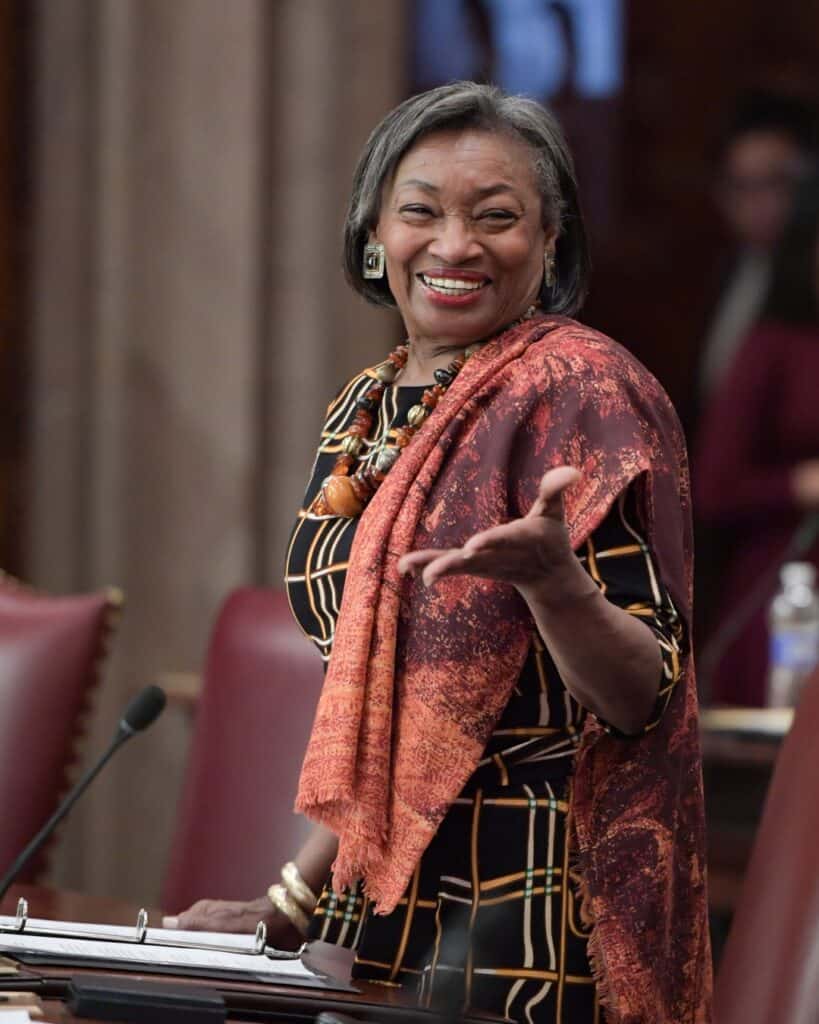
State Senate Majority Leader Andrea Stewart-Cousins
Under the leadership of Majority Leader Andrea Stewart-Cousins, the New York State Senate passed a state budget Saturday for the 2024-25 fiscal year which keeps key promises to New Yorkers on important topics including education, infrastructure, and housing.
The budget reflects Sen. Stewart-Cousins’ commitment to hard working New York families, children and seniors, tackling pressing issues from affordability to health care, and advancing Sen. Stewart-Cousins’ vision for a fairer, more prosperous New York for all.
“I am proud of this state budget, which prioritizes the needs of working families and invests in critical areas such as affordability, education, housing, healthcare and the environment. Together, we have enacted a budget which delivers real progress for New Yorkers,” Sen. Stewart-Cousins said. “I thank my Senate colleagues, Speaker Heastie and our legislative partners in the Assembly, and Governor Kathy Hochul for their collaboration and dedication to this crucial process.”
The FY 2025 budget continues the state’s commitment to our public schools by ensuring no cuts to school funding and rejecting proposed changes to Foundation Aid. The budget provides an additional $100 million for Universal Pre-K and more than $120 million for SUNY colleges and universities. It will also expand the Tuition Assistance Program by more than $50 million while increasing the household income threshold for the first time since 2000.
“A solid education is the key to a long and productive career. Continuing to fully fund Foundation Aid is crucial to fulfilling our commitment to New York families who demand a quality education for their children,” Sen. Stewart-Cousins said. “Through this budget, we kept that promise and expanded access to Universal Pre-K and to higher education, to help more New Yorkers meet their education goals.”
For the first time in more than a decade, the FY 2025 budget increases Aid and Incentives for Municipalities (AIM) funding, providing an additional $50 million for a total of $765.2 million to help municipalities fund crucial local infrastructure projects.
“This budget makes smart investments in our roads, bridges, sewer systems and other infrastructure that get us where we need to go,” Sen. Stewart-Cousins said. “It includes record support for infrastructure, including an extra $60 million for CHIPS, for a total of nearly $600 million and additional $10 million in additional funds Upstate public transit funding.”
Amidst the ongoing housing crisis, Majority Leader Stewart-Cousins secured a transformative housing deal aimed at addressing both affordability and supply issues plaguing the current market. This historic deal includes a comprehensive set of measures to protect tenants, support homeowners, and incentivize the creation of affordable housing across the state.
“Ensuring affordable housing is essential for renters to build their lives with security in our state. This deal provides crucial protections against unfair hikes and evictions,” said Sen. Stewart-Cousins.
For homeowners, the FY 2025 budget offers vital safeguards against foreclosure, addresses the crime of deed theft, and codifies the distinction between tenants and squatters to make prosecution easier, securing their homes and futures.
“We cannot expect people to make their lives from start to finish in our great state if average homes cost luxury prices. It was beyond time to reach a housing deal that addressed head-on the realities that families on the ground are facing,” said Sen. Stewart-Cousins.
Majority Leader Stewart-Cousins also secured critical support for local print media through a new Newspaper and Broadcast Media Jobs Program, which includes key measures to support and promote local print media, such as a tax credit for qualifying independently-owned print media or broadcasting businesses.
“News media is America’s ‘fourth branch of government,’ but small newspapers and news organizations can struggle to compete and reach audiences with crucial local news that affects our daily lives,” Sen. Stewart-Cousins said. “Thanks to the Senate’s efforts, the enacted budget includes a tax incentive which will work to directly support the employment and retention of local journalism and media jobs.”
Furthering Sen. Stewart-Cousins’ commitment to keep New York communities safe, the FY 2025 budget takes action to empower law enforcement to curtail retail theft by bolstering protections for small businesses and elevating assaults on retail workers to a felony, protecting workers and punishing offenders for this serious offense.
“Allowing prosecutors to aggregate stolen goods for higher larceny charges will strengthen efforts to combat retail theft,” Sen. Stewart-Cousins said. “With dedicated Retail Theft Teams and tax credits for small businesses investing in security measures, we’re taking comprehensive action to safeguard our communities and support our local businesses.”
Additional FY 2025 enacted budget highlights include:
Revitalizing Housing for All New Yorkers
Hard fought Senate Majority proposals in final package:
- Housing Opportunities for the Future – a new $150 million program to build affordable homes and rentals across New York State.
- A new opt-in construction or commercial conversion tax exemption for affordable housing outside the City of New York.
- Authorization for municipalities to adopt a local tax exemption to make it easier for individuals to build accessory dwelling units.
Historic Tenant and Homeowner Protections:
Some of the state’s strongest tenant protections with the enactment of “Good Cause” protections:
- Immediately effective in New York City, and localities outside of New York City may opt in and provide for flexibility in defining the small landlord and high-rent exemptions.
- A rent increase is presumptively unreasonable if it is greater than the annual change in CPI plus 5%, or 10%, whichever is lower.
- A lease can only be terminated for one of the good causes outlined within the bill.
Crucial funding towards affordable housing and homeowner protections, such as:
- $75 million to support public housing authorities outside of New York City.
- $40 million in the Homeowner Protection Program (HOPP)
- $40 million in Eviction Protection Funding outside of New York City
Restoration of Public Education Funding and Supporting SUNY/CUNY
- Rejecting the Executive’s proposal to eliminate Hold Harmless and also increasing Foundation Aid for the poorest 63 districts in the State.
- $180 million to continue our historic commitment to providing universal school meals for thousands of New York children.
- An additional $100 million for Universal Pre-K to allow school districts throughout the state to serve at least 90% of eligible four-year-olds.
- $60 million for SUNY Operating Aid, and $40 million for CUNY Operating Aid
- Increases the Tuition Assistance Program–for the first time since 2000–by $53 million to make college more affordable.
Supporting Working Families and Making Daily Life More Affordable
- $350 million for a new tax credit to provide support to working families, and the lowest Middle-Class Tax rate in over 70 years, saving New Yorkers millions of dollars.
- Children ages 0-6 can be continuously enrolled in Medicaid or Child Health Plus, to ensure stable and affordable health insurance for their first years.
- $1.78 billion for the New York State Child Care Block Grant, which will provide subsidies for 119,000 children.
- $280 million in federal pandemic funds for the Workforce Retention Grant program.
Spurring Economic Growth and Supporting New York Small Businesses
- Retail Security Tax Credit to help small businesses keep employees safe.
- $1 million in funding for the Minority and Women-Owned Business Development lending program.
- Increased enforcement powers for the Office of Cannabis Management (OCM) to enable cities and counties to crack down on illegal cannabis shops.
Investing in Mental Health Services and Access to Quality and Affordable Healthcare
- $7.5 billion invested in New York’s health care system to promote health equity, diminish health disparities, and enhance access to primary and behavioral health care.
- $800 million in support for distressed and safety-net hospitals.
- Continuing to increase the minimum wage for home care workers.
- Eliminating cost-sharing for insulin for thousands of New Yorkers.
- $55 million to establish 200 new inpatient psychiatric beds at State-run facilities.
- $19 million for mental health services for school-aged children.
- $75.8 million increase for Crisis Services.
Supporting Reproductive and Maternal Health
- Passing the first in the nation Paid Prenatal Leave, providing 20 hours of paid sick time for pregnant employees to use for their prenatal care visits.
- Codifying the Reproductive Freedom and Equity Grant Program to provide funding for abortion providers and non-profits.
- Requiring paid breaks for breast milk expression in the workplace for 30 minutes.
Fostering Children’s Wellbeing and Advancing Youth Development
- $103.2 million for After School Programs; $10 million for the Youth Sports Initiative; $15.6 million for the Youth Development Program; $8.1 million for the Runaway and Homeless Youth Act program; $7.2 million for Child Advocacy Centers.
Commitment to New York’s Environmental and Climate Goals
- $500 million for the Clean Water Infrastructure Act.
- $400 million to support climate priorities across New York State.
- $1 billion for the Office of Parks, Recreation and Historic Preservation
- Investing $47 million to plant 25 million trees by 2033.
Investing in Local Communities by Funding Local Government and Critical Infrastructure
- $50 million increase in AIM funding for local governments, the first increase in AIM in over a decade for a total of $765.2 million.
- Increased Funding for Public Transportation Across New York State:
- $4.2 billion for the MTA, an increase of $140 million from the past year.
- $551 million for non-MTA downstate systems.
- Critical funding for roads:
- $598 million in funding for CHIPS; $140 million for State Touring Routes; $200 million per year for BRIDGE NY; $150 million per year for PAVE NY; $200 million to Pave our Potholes; $100 million for Extreme Winter Recovery
Investing in Public Safety and Combating Hate Crimes
- $2.8 million in funding for the Westchester County Policing Program
- Expanding the range of offenses that can be prosecuted as hate crimes.
- $35 million to safeguard houses of worship, religious schools, and other vulnerable locations.
- $347 million to continue efforts to reduce and prevent gun violence in New York.
- $35.7 million to combat and prosecute domestic violence crimes.
- $7.1 million to provide more intensive supervision for individuals on parole.
- Creates a Class E felony for assaulting a retail worker and allowing for aggregation of retail theft crimes to make it easier to prosecute repeat offenders.
- Protecting against sexually explicit Artificial Intelligence – expands the existing statutory right to privacy by adding “likeness and voice” to the list of protected characteristics.
- $30 million for AAPI Equity Coalition priorities for crisis intervention initiatives and to combat bias crimes.
###
Senate Majority Leader Andrea Stewart-Cousins represents a significant portion of Yonkers, the Town of Greenburgh, and the Town of Mount Pleasant in the 35th NYS Senate District. To learn more about her legislative and community efforts, click here.





